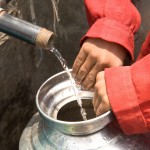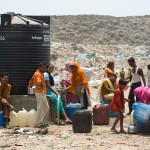You are here
One Clean Drop at a Time: Making Water Safe in Developing Countries
This story was gathered by David Snyder. David reports on CDC programs in action for the CDC Foundation.
Eric Mintz, M.D., lead for CDC′s global water, sanitation and hygiene epidemiology team, has traveled the world to help bring safe water to families in developing countries. A renowned safe water expert, he remembers fighting a cholera epidemic in a small fishing village in Peru shortly after joining CDC in 1989. Within months, the outbreak took hold across Peru and into neighboring countries.



“The outbreak spread so rapidly it was hard to keep up with it,” said Mintz. “But we trained people in surveillance and diagnostics, and taught them how to recognize, treat and prevent cholera.”
While advising people to boil their water offered a short-term solution to the crisis, Mintz and his team quickly realized that the firewood required to boil water wasn’t environmentally or economically sustainable.
“We were looking at things people could do other than boiling their water,” Mintz said. “We wanted something inexpensive, simple and proven that could be scaled up quickly.”
They came up with an affordable, easy solution that involves treating drinking water with diluted chlorine bleach, storing it safely in a narrow-mouthed, lidded vessel and hand washing with soap and water. Known as the Safe Water System, the technology was developed by CDC and the World Health Organization. Today the CDC Foundation connects CDC with a wide range of outside partners to launch or expand safe water programs all over the world.
“Unclean water is a huge burden but one that’s easy to solve with simple, affordable solutions,” Mintz said. “As water becomes more scarce on an increasingly hot and crowded planet, the need for solutions is much more immediate. There are definite links between water quantity and health. The less water you have, the less likely you are to practice hygiene around the home.”
As CDC works closely with other U.S. government agencies and international partners in support of the Haitian government’s response to the 2010 cholera outbreak, Mintz is reminded that the need for safe water is universal.
“It doesn’t matter who you are or where you live. Everyone needs water,” he said. "The life-saving impact of safe water is very real.”
